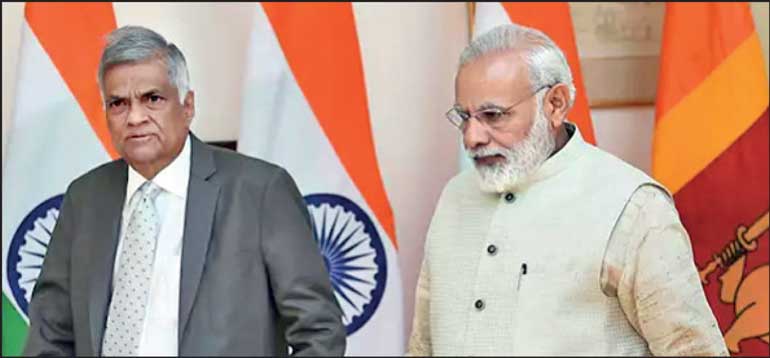Monday Feb 16, 2026
Monday Feb 16, 2026
Friday, 30 June 2023 00:43 - - {{hitsCtrl.values.hits}}

 I was in Delhi in January this year where I was hosted for a private lunch by Dr. Montek Singh Ahluwalia (Former Cabinet rank Chairman of India’s Planning Commission). I was very fortunate to have an over 3 hour one on one conversation with him through which I understood how similar India and Sri Lanka were economically. India made a change in 1991 and since then it has never gone to the IMF. Though Sri Lanka liberalised much earlier, many reforms were reversed with a turn towards import substitution in the mid-2000s. The economies are similar and greater economic integration between the two nations can bring greater benefits to the people in Sri Lanka.
I was in Delhi in January this year where I was hosted for a private lunch by Dr. Montek Singh Ahluwalia (Former Cabinet rank Chairman of India’s Planning Commission). I was very fortunate to have an over 3 hour one on one conversation with him through which I understood how similar India and Sri Lanka were economically. India made a change in 1991 and since then it has never gone to the IMF. Though Sri Lanka liberalised much earlier, many reforms were reversed with a turn towards import substitution in the mid-2000s. The economies are similar and greater economic integration between the two nations can bring greater benefits to the people in Sri Lanka.
Economic integration
By economic integration, I am referring to reducing trade barriers, increasing investment flow back and forth and aligning sectors in the Sri Lankan economy with the fast growing Indian economy promoting economic growth. Sri Lanka has a Free Trade Agreement with India and greater utilisation of it will have greater benefits.
It makes perfect sense for greater economic integration for Sri Lanka as India is the third largest economy in the world when looked at in terms of purchasing power parity and is set to be the third largest economy by 2035 in terms of GDP. It is the fastest growing major economy showing growth when the other major economies such as the US, EU and China are experiencing slower economic growth.
According to a Deloitte report, if Tamil Nadu can sustain its current average annual growth of 10%, it can become a $ 1 trillion economy by 2034. Tamil Nadu’s economy itself is almost as big as Pakistan’s economy. Recently, the global giant Apple announced shifting parts of its supply chain to the state.
How Sri Lanka can benefit from closer economic ties with India
Increased trade and economies of scale – Greater economic integration will result in increased export opportunities for Sri Lankan firms. India is Sri Lanka’s largest trading partner. As the Indian economy is growing at a fast pace with India set to have a $ 10 trillion economy with a rising middle class. Certain industries will struggle to compete with Indian goods coming into Sri Lanka but at the same time, open trade with India will give Sri Lankan firms the opportunity to tap into a larger market which is in closer proximity and allow Sri Lankan firms to develop economies of scale which they can use to export to the rest of the world as well. An interesting fact about the India - Sri Lanka Free Trade agreement is that over 60% of Sri Lankan exports to India since ISLFTA have been using ISLFTA benefits while only 5% of Indian exports have used ISLFTA benefits. Even though Sri Lanka has a trade deficit with India, it is Sri Lanka that is using the FTA’s benefits more.
Increased FDI and access to resources – India is one of Sri Lanka’s largest FDI contributors. Greater economic integration can also allow for larger investments into Sri Lanka by Indian firms which can create job opportunities for Sri Lankans. A good example would be HCL which employs over a thousand Sri Lankans which leads to tech and skills transfer. Indian firms can also use Sri Lanka to access other major markets creating job opportunities for Sri Lankans.
Increased consumer choice – Greater economic integration with India will result in increased competition for Sri Lankan firms resulting in better prices and quality of goods and service. This will also result in greater innovation by Sri Lankan producers as they give out the best for local demand which can result in the product/service quality increasing and Sri Lankan firms being able to export more to India and later to the rest of the world. Sri Lankans will also be able to access products and services from Indian producers. Goods which a Sri Lankan firm could not produce at a competitive price with good quality because of the lack of economies of scale in Sri Lanka. Also, Sri Lankan consumers can enjoy products which are not available in Sri Lanka at better rates due to easier access.
Drive specialisation in producing certain goods – opening up trade can result in certain Sri Lankan industries which cannot compete closing down. This will divert resources which were being used by these less productive industries to be used to focus on industries where Sri Lanka can compete with other Indian firms better. This will also result in Sri Lanka producing more efficient export sectors.
The writer is an Economist at the Deloitte Economics Institute and a member of the Deloitte Global Economist Network. He is an Expert Member of the World Economic Forum and a regular columnist for the International Monetary Fund (IMF). Opinions expressed are the author’s own.